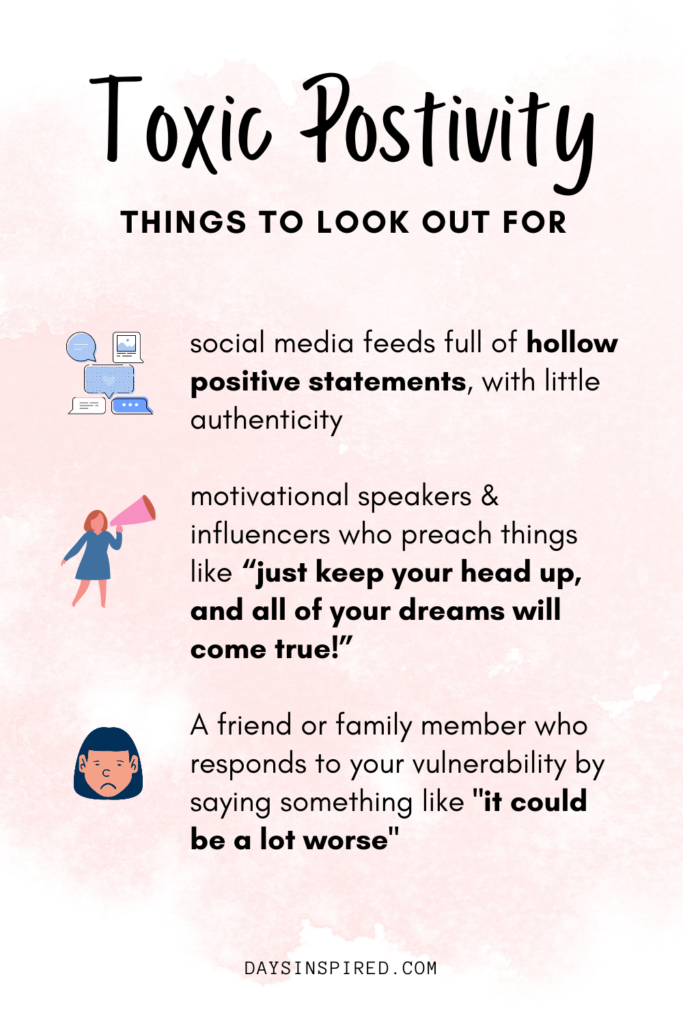Have you ever confided in a friend about a struggle you experienced, only to have them respond with something like:
“just look on the bright side”,
“some people have it a lot worse. ”
And somehow, this person’s intended optimism actually made you feel worse? That’s toxic positivity in a nutshell.
Toxic positivity is a confusing phrase… positivity is a good thing, right? Yes, there are documented benefits of positive thinking. But too much in the wrong context can actually be harmful. In this post, I’m covering what toxic positivity is, why it’s harmful, and how to avoid it in your own life.
What Is Toxic Positivity?
Clinical psychologist Dr Jaime Zuckerman explains: “Toxic positivity is a societal assumption that a person, despite their emotional pain or gravity of their situation, should only strive to have a positive outlook.”
The underlying tone of toxic positivity suggests that negative emotions, in all forms, are inherently bad and should be avoided. Even if the cost of doing so is putting on a false facade or minimizing others emotions.
Have You Experienced Toxic Positivity?
Whether you’ve heard the term “toxic positivity” before or not, it’s likely you’ve experienced it in some form or another.
Toxic positivity does not just come from family & friends. Unfortunately, some of the ideas behind toxic positive are so pervasive even popular celebrities, authors, & influencers spread them. A couple other things to keep an eye out for:
- motivational speakers & authors who preach things like “just keep your head up, and all of your dreams will come true!”
- social media feeds full of hollow positive statements, with little authenticity
If you’ve experienced any of these situations, you’re likely familiar with the sinking feeling of having your negative emotions dismissed or invalidated. But that’s not the only reason toxic positivity is harmful.
3 Reasons Toxic Positivity is Harmful
It Causes us to Judge our Feelings
Because toxic positivity perpetuates the idea that all negative feelings are bad, it causes us to judge our own negative feelings. In reality, it’s completely natural and healthy to experience a wide range of emotions. Automatically bucketing these emotions into “good” and “bad” causes feelings of guilt & shame.
It Fosters Inauthenticity
Toxic positivity, unfortunately, is contagious. When we see others who seem positive and happy all the time, it can cause us to feel like we need to be the same way. This perpetuates inauthenticity— where nobody feels like they an express or feel any negative emotions.
Need an example of this? Just look at social media. A large reason for the inauthenticity we see on social media is due to this cycle of toxic positivity.
It Encourages Us to Suppress Our Feelings
When you are led to believe all negative emotions are inherently bad, it’s natural to want to suppress them. There’s plenty of research that tells us this is NOT a good idea for our mental health. All emotions are worthy & valuable, but the only way we can get this value is to process them fully.
5 Ways to Avoid & Counteract Toxic Positivity
Be Vulnerable
To be vulnerable is to share from an open-hearted and authentic place. When we’re able to be vulnerable, we do our part create a safe space for all types of feelings, counteracting toxic positivity. This could mean opening up about a struggle you’re experiencing to a friend, being honest when someone asks you how your day was, or even posting an unedited photo on social media. If we could all drop the perfection act a little bit, I bet we’d feel less of a need to use toxic positivity as a shield.
Recognize Toxic Statements
Honestly, we’ve probably all accidentally used a toxic positivity phrase at some point. Learning to recognize these common statements and avoid them in our speech can help us be more emotionally supportive of those around us.
Here’s a few examples:
- just look on the bright side
- some people have it a lot worse
- failure is not an option
- good vibes only
- cheer up!
Next time you’re comforting a friends, try language like this instead:
- I am here for you through this.
- This must be really tough. What can I do to help?
- Do you want to talk more about it?
- It’s okay to feel how you feel right now.
Practice Emotional Mindfulness
Mindfulness means to be aware of our experiences in a nonjudgmental way. When it comes to our feelings, emotional mindfulness allows us to make space for our emotions without suppressing them.
So next time you feel upset about something, don’t immediately push this thought aside. Sit with it, understand why you’re feeling that way, and work through it.
Validate Yourself and Others
Your feelings, no matter that they are, are valid. By telling yourself and others this, we give space to emotions and help overcome toxic positivity. One great way to do this is through affirmations that you repeat to yourself or write each day.
Be Intentional About Your Social Media Feed
Toxic positivity is pervasive on social media, and it expands way beyond just positive vs negative feelings. The kind of toxic positivity on social media can make us feel bad about our bodies, our success, our looks, and more. Then, it shames us for feeling this way in the first place.
To clear toxic positivity from your feed, be mindful of how the posts you are seeing make you feel. If it causes you to feel guilt and shame, there may be an element of toxic positivity to consider. And if that’s the case, it’s probably time to unfollow.
Understand The Difference Between Toxic Positivity & Genuine Optimism
While toxic positivity is harmful, a positive mindset is proven to be helpful. So where’s the line between toxic positivity and genuine optimism? Toxic positivity is rooted in pushing through and ignoring negative emotions. Genuine optimism is rooted in processing and finding purpose in our emotions. This simple idea can help us identify where toxic positivity may take hold in our own lives.
Toxic positivity is a phrase that’s just becoming popular, but it puts a name to a feeling we’ve likely all experienced at some point. If you’ve ever been bothered by someones seemingly positive statements, but we’re unsure why, I hope this information has put your mind at ease.
The fact of it is, toxic positivity is not helping anyone, and is actually dangerous. Remember, It’s okay to not be okay. One of the best things we can do for ourselves, our friends, and our family, is to make a safe space for all of our feelings.
Pin This Post





